名词的抽象和具体译法
- 格式:ppt
- 大小:450.00 KB
- 文档页数:21
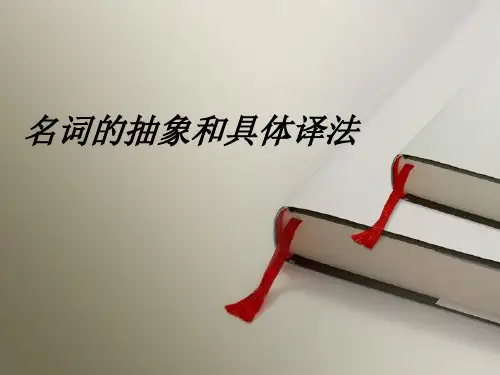
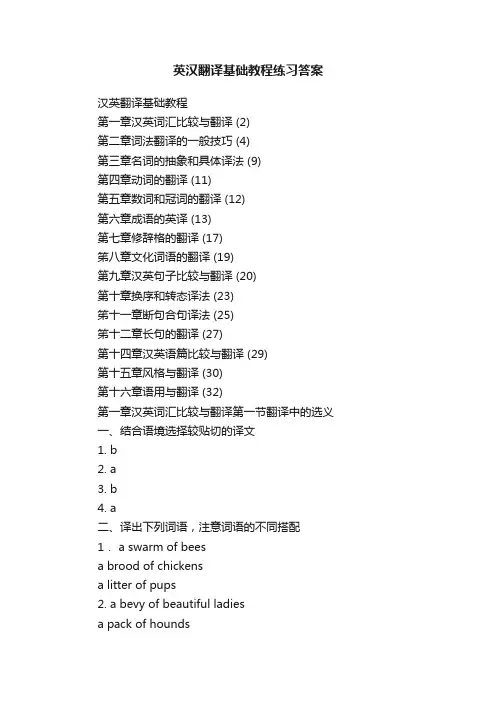
英汉翻译基础教程练习答案汉英翻译基础教程第一章汉英词汇比较与翻译 (2)第二章词法翻译的一般技巧 (4)第三章名词的抽象和具体译法 (9)第四章动词的翻译 (11)第五章数词和冠词的翻译 (12)第六章成语的英译 (13)第七章修辞格的翻译 (17)笫八章文化词语的翻译 (19)第九章汉英句子比较与翻译 (20)第十章换序和转态译法 (23)笫十一章断句合句译法 (25)笫十二章长句的翻译 (27)第十四章汉英语篇比较与翻译 (29)第十五章风格与翻译 (30)第十六章语用与翻译 (32)第一章汉英词汇比较与翻译第一节翻译中的选义一、结合语境选择较贴切的译文1. b2. a3. b4. a二、译出下列词语,注意词语的不同搭配1. a swarm of beesa brood of chickensa litter of pups2. a bevy of beautiful ladiesa pack of houndsa team of ducksa herd of antelopes3. unfailing supportproactive fiscal policymake effective use of overseas resources4. make a phone calltake a taxiknit a woolen sweaterfetch waterplay basketballspray insecticide5. basic wagecapital constructionessential commodityprimary industryfundamental interest三、翻译下列句子,注意画线词语的理解1. The two leaders exchanged views on bilateral relations and issues of common concern2. Party members should listen carefully to the opinions of the general public.3. They offered some suggestions for the revision of the plan.4. Everyone complained against such a practice.5. They had a dispute at the meeting.6. You should follow the doctor's advice.7. They reached a consensus on this issue.8. There is still some unfinished business to settle.9. We have consulted him about the matter.10. Please go back. There is nothing of your concern now第二节翻译中的选词一、翻译下列各句,注意词的选择和搭配。
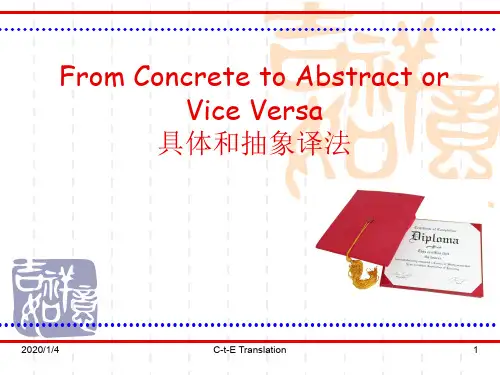
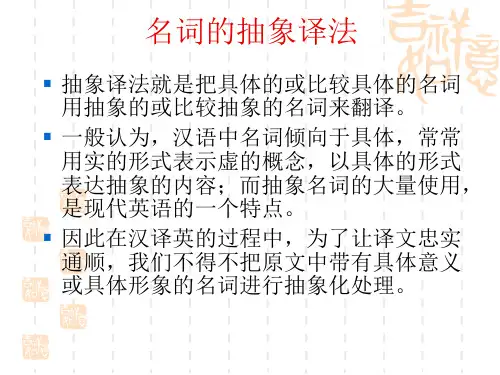
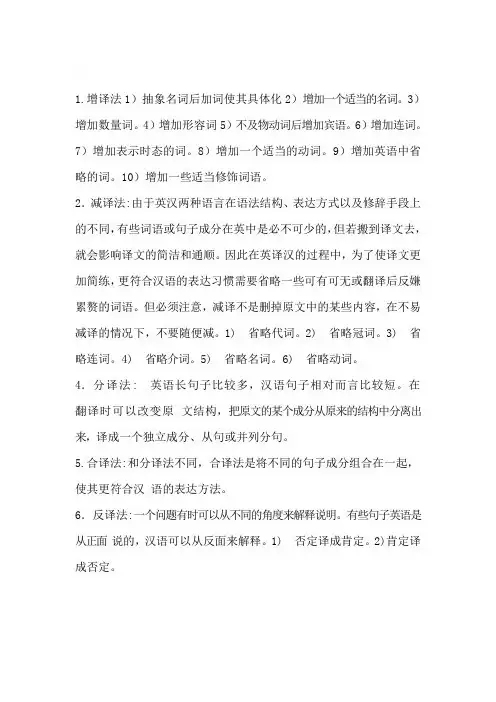
1.增译法1)抽象名词后加词使其具体化2)增加一个适当的名词。
3)增加数量词。
4)增加形容词5)不及物动词后增加宾语。
6)增加连词。
7)增加表示时态的词。
8)增加一个适当的动词。
9)增加英语中省略的词。
10)增加一些适当修饰词语。
2.减译法:由于英汉两种语言在语法结构、表达方式以及修辞手段上的不同,有些词语或句子成分在英中是必不可少的,但若搬到译文去,就会影响译文的简洁和通顺。
因此在英译汉的过程中,为了使译文更加简练,更符合汉语的表达习惯需要省略一些可有可无或翻译后反嫌累赘的词语。
但必须注意,减译不是删掉原文中的某些内容,在不易减译的情况下,不要随便减。
1) 省略代词。
2) 省略冠词。
3) 省略连词。
4) 省略介词。
5) 省略名词。
6) 省略动词。
4.分译法: 英语长句子比较多,汉语句子相对而言比较短。
在翻译时可以改变原文结构,把原文的某个成分从原来的结构中分离出来,译成一个独立成分、从句或并列分句。
5.合译法:和分译法不同,合译法是将不同的句子成分组合在一起,使其更符合汉语的表达方法。
6.反译法:一个问题有时可以从不同的角度来解释说明。
有些句子英语是从正面说的,汉语可以从反面来解释。
1) 否定译成肯定。
2)肯定译成否定。
7.顺序调整法:一般来说,翻译时应该按照句子原来的顺序进行,但由于英汉两种语言中定语、状语和一些其他成分的位置不完全相同,翻译时需要做一定的调整(例如采用倒译法),使其符合汉语的习惯。
9.被动语态翻译法1) 变为汉语的主动形式。
2) 被动结构的表化,将其翻译成"是……的"、"由……的"等3) 译成具有被动意义的汉语结构。
4) 增添"人们"、"大家等适当的词做汉语译文的主语。
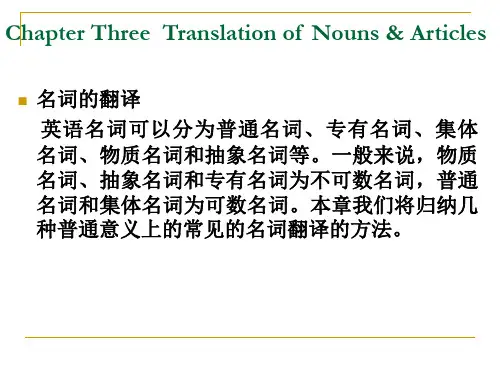
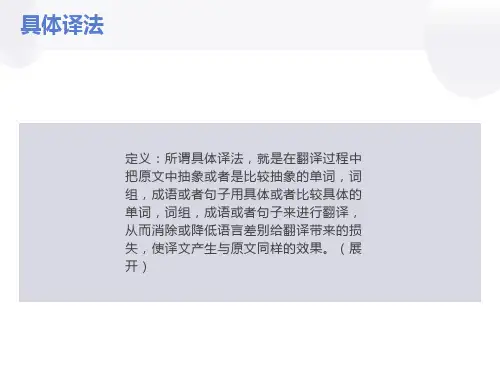
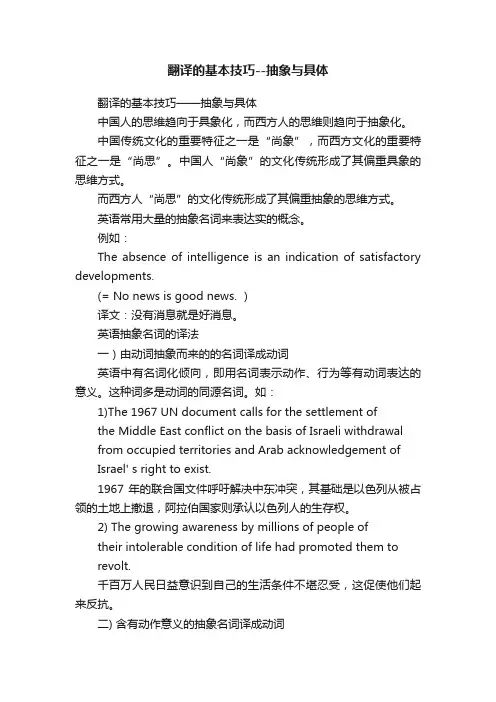
翻译的基本技巧--抽象与具体翻译的基本技巧——抽象与具体中国人的思维趋向于具象化,而西方人的思维则趋向于抽象化。
中国传统文化的重要特征之一是“尚象”,而西方文化的重要特征之一是“尚思”。
中国人“尚象”的文化传统形成了其偏重具象的思维方式。
而西方人“尚思”的文化传统形成了其偏重抽象的思维方式。
英语常用大量的抽象名词来表达实的概念。
例如:The absence of intelligence is an indication of satisfactory developments.(= No news is good news. )译文:没有消息就是好消息。
英语抽象名词的译法一)由动词抽象而来的的名词译成动词英语中有名词化倾向,即用名词表示动作、行为等有动词表达的意义。
这种词多是动词的同源名词。
如:1)The 1967 UN document calls for the settlement ofthe Middle East conflict on the basis of Israeli withdrawalfrom occupied territories and Arab acknowledgement ofIsrael' s right to exist.1967年的联合国文件呼吁解决中东冲突,其基础是以色列从被占领的土地上撤退,阿拉伯国家则承认以色列人的生存权。
2) The growing awareness by millions of people oftheir intolerable condition of life had promoted them torevolt.千百万人民日益意识到自己的生活条件不堪忍受,这促使他们起来反抗。
二) 含有动作意义的抽象名词译成动词英语中另一个倾向是许多名词有动词意义或动作意义,这类词汇在译成汉语时通常要译为动词。
如1) She said this with a provocative glance and a gleam of teeth.他说这话时挑衅地看了一眼,还把牙一呲。
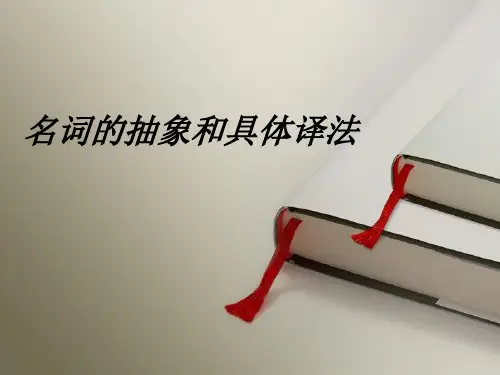
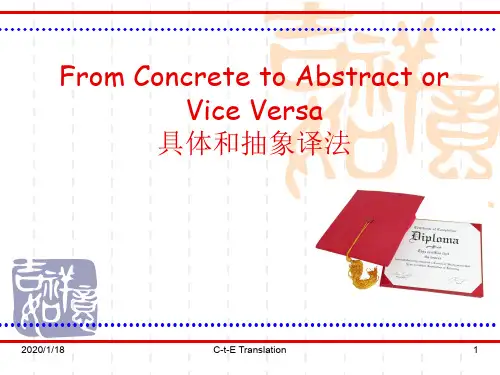
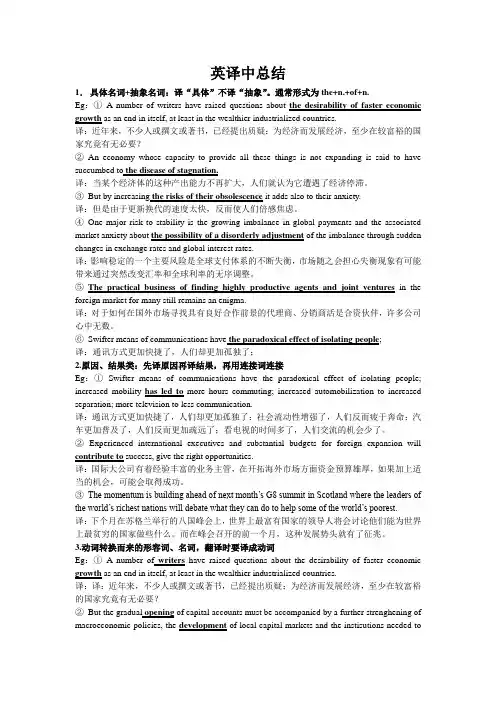
英译中总结1.具体名词+抽象名词:译“具体”不译“抽象”。
通常形式为the+n.+of+n.Eg:①A number of writers have raised questions the desirability of faster economic growth as an end in itself, at least in the wealthier industrialized countries.译:近年来,不少人或撰文或著书,已经提出质疑:为经济而发展经济,至少在较富裕的国家究竟有无必要?②An economy whose capacity to provide all these things is not expanding is said to have succumbed to the disease of stagnation.译:当某个经济体的这种产出能力不再扩大,人们就认为它遭遇了经济停滞。
③But by increasing the risks of their obsolescence it adds also to their anxiety.译:但是由于更新换代的速度太快,反而使人们倍感焦虑。
④One major risk to stability is the growing imbalance in global payments and the associated market anxiety about the possibility of a disorderly adjustment of the imbalance through sudden changes in exchange rates and global interest rates.译:影响稳定的一个主要风险是全球支付体系的不断失衡,市场随之会担心失衡现象有可能带来通过突然改变汇率和全球利率的无序调整。
第三章名词的抽象和具体译法第一节名词的抽象译法(p68)粗枝大叶to be crude and careless (with big branches and large leaves)海阔天空to talk with random( with a vast sea and boundless sky)灯红酒绿dissipated and luxurious (with red lights and green wine)纸醉金迷of life of luxury and dissipation (with drunken paper and bewitched gold)单枪匹马to be single-handed in doing sth (with a solitary spear and a single horse)赤胆忠心ardent loyalty (with red gut and heart)无孔不入to take advantage of every weakness (to get into every hole)扬眉吐气to feel proud and elated (to raise the eyebrows and let out a breath)开门见山to come straight to the point (to open the door and see the mountain)大张旗鼓on a large and spectacular scale (to make a great array of flags and drums)风雨飘摇(of a situation) being unstable (the wind and rain are rocking)二.翻译下列句子(1)这是他们夫妻之间的事情,你去插一脚干吗?That’s a business of their own, between husband and wife. Why should you get involved in? (2)别人家里鸡零狗碎的事情你都知道得这么全,真是个顺风耳啊!You know all the bits and pieces of trifles of other families. You are really well informed. (3)这消息让我出了一身冷汗。